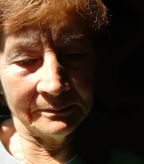Elevation of Some Genomic, Inflammatory Markers Associated With Cancer-Related Fatigue
High levels of certain immunogenomic and inflammatory markers are associated with cancer-related fatigue in some survivors, according to a review of existing literature.
High levels of certain immunogenomic and inflammatory markers are associated with cancer-related fatigue in some survivors, according to a review of existing literature. In many patients, though, adjustments for covariates yielded a confusing picture of relationships between these markers and fatigue.

“Fatigue is one of the most commonly reported symptoms in cancer with a prevalence rate of 59% to 100% depending on the clinical status of the disease,” wrote researchers led by Leorey Saligan, PhD, RN, of the National Institute of Nursing Research in Bethesda, Maryland, in Brain, Behavior, and Immunity. Research on connections between immune markers and cancer-related fatigue has been limited, which in turn could be limiting its management.
The authors reviewed 34 papers that examined connections between immunogenomic markers and fatigue. Specifically in longitudinal studies, they found that elevated fatigue symptoms particularly in women with early stages of breast cancer were associated with high levels of neutrophil/monocyte, interleukin-1ra (IL-1ra), and IL-6 during radiotherapy, and with high levels of CD4*, IL-1B, and IL-6 with stressing stimuli.
The cross-sectional studies, in general, failed to show consistent associations between the various markers and fatigue, especially when covariates such as body mass index and types of treatment were considered. Still, the authors noted that the longitudinal study review “provides empirical support for the association between high levels of cancer-related fatigue and elevated systemic inflammatory markers (CRP, neutrophils, monocytes, lymphocytes); increased signal of immune response (CD4*); high cytokine concentrations (IL-6, IL-1B) concentrations; and increased markers of cytokine activities (IL-1ra, sTNF-R1I).” Four cross-sectional studies did find significant associations between fatigue levels and signals of immune response.
The main result of such associations at this point is to identify gaps in our knowledge of fatigue and such markers and to plan further research accordingly. First of all, because only 29% of the total studies included in this review were longitudinal, there is a clear need to use such designs further in the future. Another methodological gap is the lack of a strong definition for cancer-related fatigue; 22 of the 34 studies did not conceptually define fatigue at all. Also, a number of different questionnaires were used to assess fatigue levels, only two of which were validated as sensitive to changes in cancer progression or treatment.
“Careful sample and study design selection, utilization of valid and reliable cancer-related fatigue measures that are sensitive to changes in fatigue over time, and inclusion of relevant covariates in statistical analyses are important considerations in designing future trials,” the authors wrote.
Study details
Ten of the 34 studies were longitudinal and 24 were cross-sectional. Eighteen studies enrolled only women, while only one enrolled only men; seven focused on terminal cases. There was one study of pediatric patients, and seven studies of breast cancer survivors that were all conducted by one research team.
2 Commerce Drive
Cranbury, NJ 08512
All rights reserved.